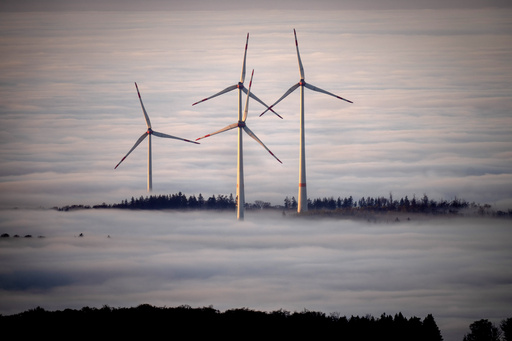A recent report highlights that a historic 47% of the electricity produced in the European Union now comes from solar energy and other renewable sources. This figure further emphasizes the widening difference between the EU’s commitment to clean energy and the current U.S. administration’s inclination towards fossil fuel use.
Nearly 75% of the electricity generated in the EU is free from emissions that contribute to climate change, with an additional 24% sourced from nuclear energy, according to findings from the climate-focused think tank Ember. In stark contrast, countries such as the United States and China continue to rely heavily on fossil fuels, which account for nearly two-thirds of their energy generation.
Analysts express optimism about the EU’s reduction in fossil fuel use, especially as the U.S. appears poised to increase its emissions due to a new presidential administration that promotes lower gas prices, has paused offshore wind project leases, and vows to eliminate incentives for electric vehicles established during the previous administration.
Chris Rosslowe, an energy expert from Ember, noted, “Fossil fuels are losing their grip on EU energy.” In 2024, solar power generated 11% of the EU’s electricity, surpassing coal, which dropped below 10% for the first time. Additionally, clean wind energy has consistently produced more electricity than gas for the past two years.
It’s important to note that 2024 figures are not yet available for all EU member states. However, Ember’s 2023 data on global electricity generation indicates that Brazil leads with nearly 89% of its electricity produced from renewable sources, primarily from hydroelectric power. Other significant contributors include Canada at about 66.5%, China at 30.6%, France at 26.5%, the U.S. at 22.7%, and India at 19.5%.
The swift transition to clean energy in Europe can be partly attributed to the European Green Deal, an ambitious initiative established in 2019 that facilitated updates to climate legislation. This deal set more aggressive goals, aiming for a 55% reduction in emissions by 2030 and striving for climate neutrality by 2050, which means virtually no additional emissions entering the atmosphere.
Various regulations and directives have been crafted across Europe to encourage investment in clean energy and minimize carbon emissions. “At the start of the Deal, renewables made up one-third while fossil fuels represented 39% of Europe’s electricity,” Rosslowe remarked. “Now, fossil fuels account for only 29%, with wind and solar pushing the clean energy agenda forward.” The role of nuclear energy in the region has remained largely stable throughout this transformation.
The ongoing conflict resulting from Russia’s invasion of Ukraine has accelerated Europe’s shift towards clean energy. Surging gas prices—given the reliance on Russian gas—have compelled nations to explore more affordable and cleaner energy options. Countries like Portugal, the Netherlands, and Estonia have seen the most significant growth in clean energy over the past five years.
Consequently, Europe has reinforced its position as a leader in clean energy, managing to save over $61 billion in fossil fuel imports for power generation since the initiation of the Green Deal.
Pieter de Pous, an energy analyst based in Brussels from the European think tank E3G, stated, “This clearly indicates that the energy needs of the region will increasingly be met through renewable sources, not gas imports.” He remarked that the EU has transformed from its coal and steel roots into a modern community focused on solar and wind power, along with batteries and smart technology.
However, growth in nuclear energy within the bloc has decelerated. The construction of new nuclear facilities has not kept pace with the number of reactors being retired since approximately the mid-2000s, according to Global Energy Monitor.
With the U.S. withdrawing from the Paris Agreement aimed at reducing climate change and adopting a “drill, baby, drill” strategy, the leadership role of the EU in the clean energy sector is crucial, according to Rosslowe. “It’s about enhancing European energy independence and demonstrating climate leadership,” he emphasized.
On a recent occasion, EU chief Ursula von der Leyen remarked, “Europe will remain steadfast and continue collaborating with all nations committed to environmental protection and combating global warming.”
